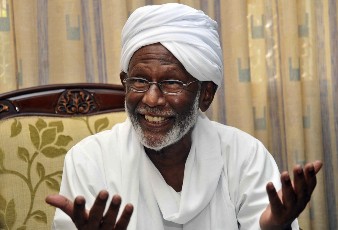Sudan’s Turabi: our engagement in dialogue is driven by desire to reunite Islamic forces
April 12, 2014 (KHARTOUM) – The leader of Sudan’s opposition Popular Congress Party (PCP), Hassan Al-Turabi, said they have agreed to engage in unconditional dialogue with the ruling National Congress Party (NCP) in order to unify Islamic forces and maintain cohesion of the country.

The Islamist leader said his decision to join the dialogue was driven by the desire to discuss urgent issues.
“The rules of governance in Islam allow for offering [a] wide range of freedoms not tyranny, and provide that unity of the country must be based on a contract of citizenship and consensus,” he said.
Turabi stressed the aim of his party’s participation in national dialogue is to “restore cohesion among Sudanese people and between the Islamic forces and other political forces”, adding that pressing “regional and international circumstances dictated rapprochement with the regime”.
Several factions within the PCP have since warned that the collapse of the regime would mean end of the Islamic political project, calling on Islamists within the government and opposition to join efforts in order to preserve an Islamic state in Sudan.
Power struggles and corruption scandals have rocked the ruling party.
It is understood the NCP is prepared to make some concessions to Turabi’s PCP and the National Umma Party (NUP), led by Sadiq Al-Mahdi, in order to pave the way for a large political base for the regime, with the Democratic Unionist Party already agreeing to participate in the government.
The PCP leader said the party was prepared to continue with dialogue until an agreement is reached on national issues and a reasonable timeframe is set to discuss them.
Turabi denied that he preconditioned the PCP’s engagement in national dialogue with the sacking of former first vice-president Ali Osman Taha and former presidential advisor Nafie Ali Nafie, but acknowledged that some opposition parties had stipulated allowing greater political freedoms before taking part in the dialogue.
Turabi holds deep-seated personal hostility towards Taha and has accused him of standing behind his removal from power.
The PCP split from the NCP following 1999’s bitter power struggle between Bashir and Turabi, which resulted in the opposition leaders being ousted from his post as parliamentary speaker and chairman of the ruling party.
Turabi later established the PCP and has since been a vociferous critic of the very regime whose army-backed seizure of power in 1989 he orchestrated.
The Islamist leader has underscored that political forces look forward to achieving a peaceful transition of power and a just settlement of regional grievances.
He said that political forces are calling for greater public freedoms and have demanded that the NCP address urgent issues, particularly those relating to peoples’ livelihoods.
The PCP leader said that hopes for resolving the Darfur crisis are increasing, saying the Um Jaras peace forum had managed to settle most of the tribal disputes in the region.
He said that Sudan’s political forces also sought to improve relations with South Sudan, in the hopes that a newborn state might one day re-join Sudan.
In an address to the nation in January, Sudanese president Omer Hassan al-Bashir announced a four-point plan for reform “to stop the war and bring peace, free political society, fight against poverty and revitalise national identity”.
He also called on political forces and rebel groups, as long as they lay down their arms, to engage in dialogue to agree on the implementation of a national reform process.
NCP officials, including Bashir, have so far brushed aside opposition calls to delay the 2015 general elections, and have also rejected the formation of a transitional government that would work on drafting a new constitution to prepare the country for the polls.
The NUP and PCP are the only major opposition parties that have so far accepted Bashir’s call for national dialogue.
(ST)
